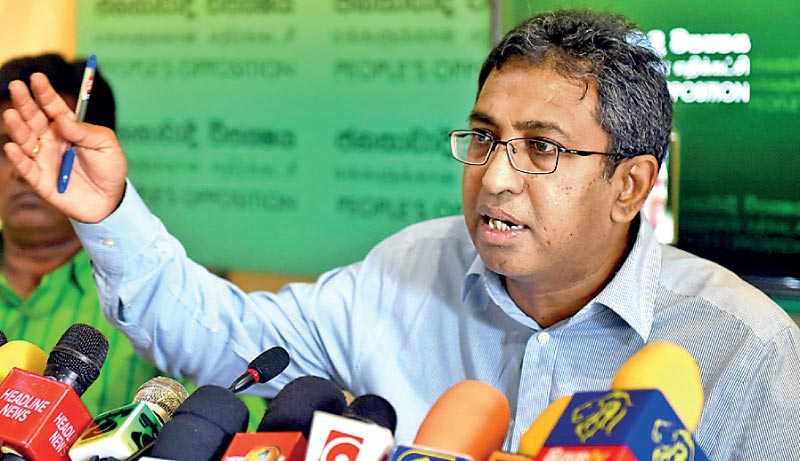Saturday Feb 21, 2026
Saturday Feb 21, 2026
Monday, 19 April 2021 03:22 - - {{hitsCtrl.values.hits}}

SJB MP Dr. Harsha de Silva along with the party’s main organiser Ajith P. Perera at the media briefing yesterday – Pic by Lasantha Perera
By Asiri Fernando
Main Opposition Samagi Jana Balawegaya (SJB) yesterday exposed serious flaws in the new Government’s plans for the ambitious and multibillion dollar Port City project and called for inclusion of proper regulation to make it a success.
SJB MP and former Economic Reforms Minister Dr. Harsha de Silva told journalists yesterday there was an urgent need for credibility of legislation, financial regulation and clarity about checks and balances for attracting the anticipated high-end investors and leading international banks to the Port City Colombo.
The Opposition MP warned that the Port City Bill, now before the Supreme Court does little to boost investor confidence and attract global banking giants to open branches in the envisaged ‘financial hub’ with legislative safeguards such as parliamentary oversight and credible financial regulation by the Central Bank, omitted from the Bill.
“We need to create the environment that attracts the right kind of investors, the leading banks and financial institutions. We don’t want fly by night type of operators. We need to make sure that we (Sri Lanka) are not tainted by having a regulatory mechanism that is not credible and not transparent, that is run by a group of people who are not responsible to the Legislature. We need a credible legislative and regulatory framework that is acceptable, that is how we can make Port City successful,” Dr de Silva argued.
Addressing journalists along with SJB Main Organiser and MP Ajith Perera, Dr. de Silva stressed that the Port City project needs to succeed as it can be a catalyst to drive the growth of the country, pointing out that the project has already transcended two Governments and will likely see several others in the coming years, prior to completion.
“As a responsible Opposition, we do not want the engage in cheap politics. We want the Port City project to be successful. The Port City project will transcend many Governments. Our aim is not to destabilise or stop the project. We want to ensure its long-term success,” Dr de Silva stressed, rejecting an allegation by Government Spokesman MP Keheliya Rambukwella that the Opposition did not want the project to succeed and opining that the Opposition’s criticism was treasonous.
Dr. de Silva argued that many of the legislative oversight and financial regulatory mechanisms which were work into the draft Bill by the Yahapalanaya Government in 2018 and 2019 was carried forward by a committee appointed by Prime Minister Mahinda Rajapaksa on the matter in 2020. The Opposition MP questioned why the safeguards in the draft bill of June 2020 were changed.
“Who changed it? Who will benefit from these changes? Do we know who will be appointed? Why are they not accountable to the Parliament?” Dr de Silva questioned.
He cited similarities between the draft bill for 2019 and the draft bill for June 2020 which both sort parliamentary approval for any new regulation or order relating to the Port City, within three months of it being gazetted by the management committee.
Dr. de Silva also argued that with the proposed Bill, the President can appoint anyone he pleases to the management committee, whereas the previous draft Bill he was involved in required State officials, who were answerable to the legislative to make up most of the committee.
The need for credible offshore financial regulations to attract global banks, financial institutions, tech giants, shipping and services conglomerates to the Port City project is now clouded by a lack of clarity about how the regulations will be formed and executed, Dr. de Silva cautioned, stressing that the accepted practice was for the Central Bank of a country to handle the regulation.
“We want to attract global banks, service and shipping sector leaders, tech giants and to make Port City a multifaceted hub. They have to be convinced that the jurisdiction and regulatory framework is credible. Normally, regulation is carried out by the Central Bank.
“Will international banks and corporations want to open a branch in a place with low credibility?” Dr. de Silva questioned, pointing out that the Yahapalanaya Government had to work hard to de-list Sri Lanka from the European Union list of high-risk countries with deficiencies in anti-money laundering and Countering the Financing of Terrorism and credited the effort by the former Central Bank Governor for the success.
Dr. de Silva also urged the Government to reinstate the legislative oversight, financial regulatory process, transparency and accountability mechanism to the Port City bill to ensure the long-term success of the project and for the benefit of the country.
MP Ajith P. Perera pointed out that only the Parliament can make law in line with the Constitution and charged that the proposed Bill will bring a new, unelected and unaccountable entity that will create laws for a part of the country. “Such a mechanism is unconstitutional. A referendum may be needed to approve such a Bill,” Perera opined.